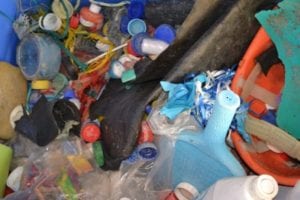The first African Marine Debris Summit has highlighted the urgent need for collective action to be taken against the problem of marine debris facing the continent of Africa.
“The marine environment has many challenges. Global warming is visible within this sphere and its impact is slowly being understood. Overfishing, acidification, chemical pollution, with the added pollution of marine debris of which the main product is plastic, is compounding the negative effect that humans have on the environment.”
This was deputy minister of Environmental Affairs Rejoice Mabudafhasi’s main message during her speech at the summit,held from 6 to 8 June 2013 at the South African National Biodiversity Institute (SANBI) at Kirstenbosch in Cape Town.
The summit, entitled ‘African lessons to inspire local actions’, focused specifically on the issue of marine debris on the African continent. Plastics|SA, the umbrella body representing the South African plastics industry, joined hands with the Department of Environmental Affairs, SANBI and the United Nations Environment Programme (UNEP) in organising the conference, which brought together marine debris researchers, natural resource managers, policymakers, industry representatives and the non-governmental community.
According to Mabudafhasi, marine debris is not just an unsightly issue that can have a negative impact on tourism and human health, but it is also responsible for deaths of a myriad of the creatures that inhabit the marine environment. “I am reminded again that 80% of all plastic found in the sea has its origins on land through littering and poor waste management so this negative impact on the environment can be reduced and even stopped,” said Mabudafhasi.
According to Douw Steyn, Plastics|SA director of sustainability, marine debris is a historical problem that continues to grow. “The world’s oceans and waterways are constantly polluted with a wide variety of marine debris ranging from cans and plastic bags to derelict fishing gear and abandoned vessels. Many animals, such as sea turtles, seabirds, and marine mammals, have been known to ingest and get entangled in marine debris, which may lead to loss of nutrition, internal injury, intestinal blockage, starvation, and even death,” Steyn said.
“International cooperation is needed to create public awareness while developing ways to decrease the amount of debris in oceans around the globe,” Steyn explained.
“Marine debris is an international concern not only because it washes up on beaches and shorelines worldwide, but also because debris can be transferred between countries, serving as a vector for alien animals and plants via ocean currents. International cooperation is needed to create public awareness while developing ways to decrease the amount of debris in oceans around the globe,” said Plastics SA executive director Anton Hanekom, who also signed the ‘Declaration for Solutions on Marine Litter’ on behalf of South Africa’s plastics industry in 2011 when plastics industry representatives from across the world met in Dubai to create a global action plan for solutions on marine litter.
This action plan described actions and identified approximately 120 projects that focused on reducing the impact the plastics industry has on the marine environment and pollution.
“Plastics|SAwas the only organisation on behalf of an African country to sign the declaration and we made it one of our goals to encourage collective action across the continent,” Hanekom said. “Hosting this summit has allowed us to clearly identify the extent of the problem of plastics in the marine environment, and we are now able to work towards a sustainable solution. As an industry, we recognise that we need to go about our business in a responsible way and although we may not yet have all the answers in place, this conference has allowed us to create a basis from which to work as we promote the responsible use, reuse and recycling of plastics on a daily basis.” The extent of the problem of marine debris and its impact on sea mammals, fish and the environment was addressed from various angles by international experts on the topic, including prof Peter Ryan, Department of Zoology, Percy FitzPatrick Ornithological Institute, University of Cape Town; Heidi Savelli of the UNEP; Dr George Hughes of the Turtle Management Programme and Dr Martin Engelmann of Plastics Europe. Moving forward According to John Kieser, Plastics|SAenvironmental manager: Coastal Provinces International Coastal Cleanup Coordinator, the summit was an enormous success and has served a platform for a formal network to be managed by UNEP for African countries on an issue that does not receive the same attention as in the developed countries. African countries in attendance at the conference included Kenya, Nigeria, Cameroon, Ivory Coast and the Seychelles, while Australia, Belgium and Germany also delivered presentations. Kieser added that the ills associated with a growing population and increasing economic growth will lead to an increase in marine litter from Africa. As such it is positive that the goals of the summit were met, one of whichwas adopting the monitoring method used by the CSIRO in Australia. This will mean that in due time countries in Africa will be able to report on marine debris using the same methodology. “But the outcome of the event,which was groundbreaking, is the establishment of a Network for African Countries on Marine Debris.This will be administered by UNEP and technologically supported by Plastics|SAand its partners. “Plans are already afoot to promote and workshop the network at the Second Global Conference on Land-Ocean Connections to be held in October in Jamaica, as it meets all the objectives of this conference. In short, Africa will start (although in a small way) the long path of the fight against marine debris and stop making plastics the pariah of the packaging industry,” concluded Keiser.






